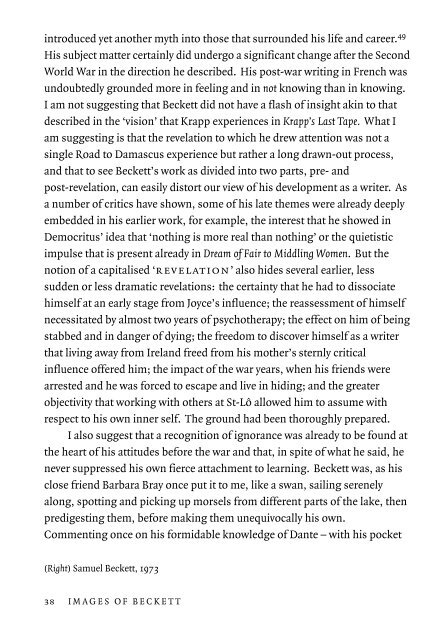Create successful ePaper yourself
Turn your PDF publications into a flip-book with our unique Google optimized e-Paper software.
introduced yet another myth into those that surrounded his life and career. 49<br />
His subject matter certainly did undergo a significant change after the Second<br />
World War in the direction he described. His post-war writing in French was<br />
undoubtedly grounded more in feeling and in not knowing than in knowing.<br />
I am not suggesting that <strong>Beckett</strong> did not have a flash <strong>of</strong> insight akin to that<br />
described in the ‘vision’ that Krapp experiences in Krapp’s Last Tape. What I<br />
am suggesting is that the revelation to which he drew attention was not a<br />
single Road to Damascus experience but rather a long drawn-out process,<br />
and that to see <strong>Beckett</strong>’s work as divided into two parts, pre- and<br />
post-revelation, can easily distort our view <strong>of</strong> his development as a writer. As<br />
a number <strong>of</strong> critics have shown, some <strong>of</strong> his late themes were already deeply<br />
embedded in his earlier work, for example, the interest that he showed in<br />
Democritus’ idea that ‘nothing is more real than nothing’ or the quietistic<br />
impulse that is present already in Dream <strong>of</strong> Fair to Middling Women. But the<br />
notion <strong>of</strong> a capitalised ‘revelation’ also hides several earlier, less<br />
sudden or less dramatic revelations: the certainty that he had to dissociate<br />
himself at an early stage from Joyce’s influence; the reassessment <strong>of</strong> himself<br />
necessitated by almost two years <strong>of</strong> psychotherapy; the effect on him <strong>of</strong> being<br />
stabbed and in danger <strong>of</strong> dying; the freedom to discover himself as a writer<br />
that living away from Ireland freed from his mother’s sternly critical<br />
influence <strong>of</strong>fered him; the impact <strong>of</strong> the war years, when his friends were<br />
arrested and he was forced to escape and live in hiding; and the greater<br />
objectivity that working with others at St-Lô allowed him to assume with<br />
respect to his own inner self. The ground had been thoroughly prepared.<br />
I also suggest that a recognition <strong>of</strong> ignorance was already to be found at<br />
the heart <strong>of</strong> his attitudes before the war and that, in spite <strong>of</strong> what he said, he<br />
never suppressed his own fierce attachment to learning. <strong>Beckett</strong> was, as his<br />
close friend Barbara Bray once put it to me, like a swan, sailing serenely<br />
along, spotting and picking up morsels from different parts <strong>of</strong> the lake, then<br />
predigesting them, before making them unequivocally his own.<br />
Commenting once on his formidable knowledge <strong>of</strong> Dante – with his pocket<br />
(Right) Samuel <strong>Beckett</strong>, 1973<br />
38 IMAGES OF BECKETT


